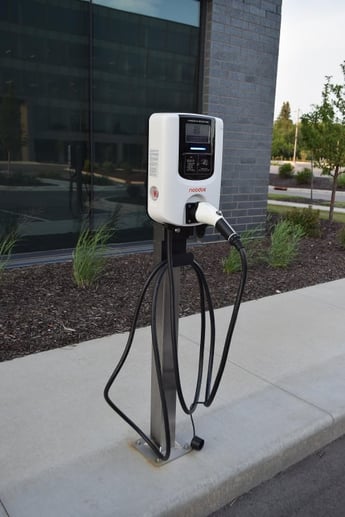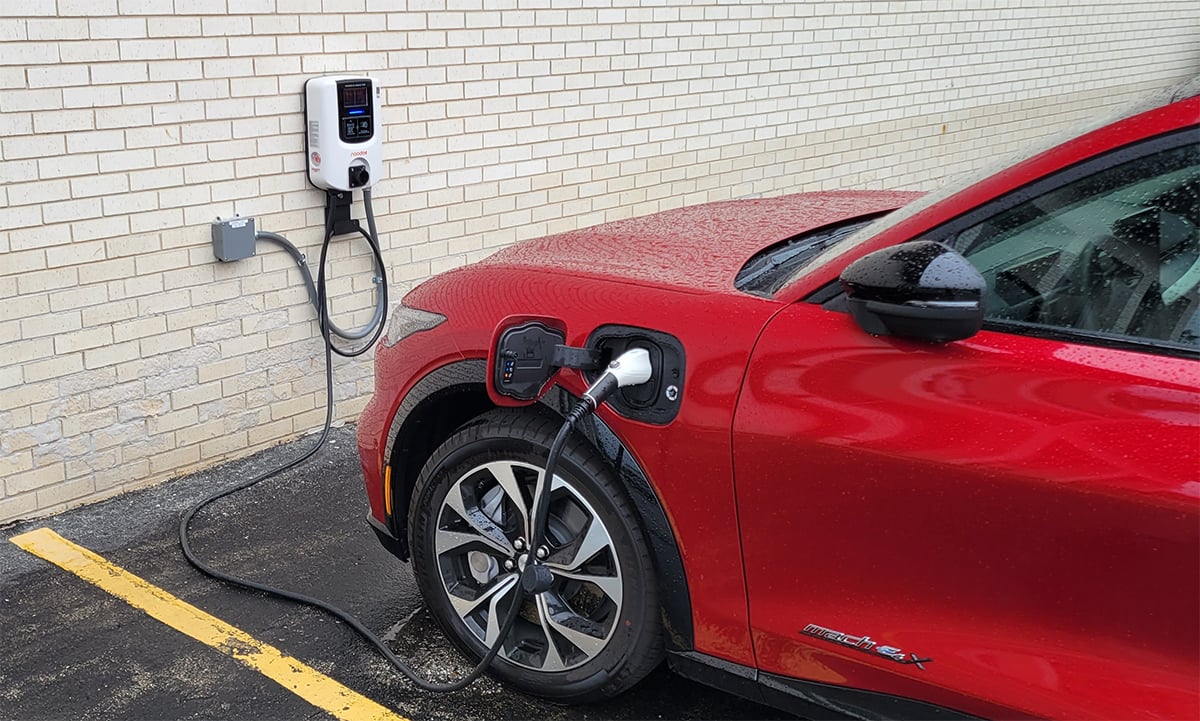 Electric vehicles (EVs) are becoming increasingly popular for a variety of reasons, including their environmental advantages, cost savings, and convenience. With EV sales jumping by two-thirds in 2022 compared to the previous years, it’s no surprise they are expected to account for the majority of vehicles on the road by 2030.
Electric vehicles (EVs) are becoming increasingly popular for a variety of reasons, including their environmental advantages, cost savings, and convenience. With EV sales jumping by two-thirds in 2022 compared to the previous years, it’s no surprise they are expected to account for the majority of vehicles on the road by 2030.
As more people switch to electric vehicles, you may be asking yourself if it’s time to invest in an EV charging station for your commercial business. The short answer is yes! There’s no denying 2023 is going to be the year of the EV boom, and installing an EV charger for your commercial business is a great way to stay ahead of the trend and provide added convenience to your customers and employees.
Below, we dive into the EV charging process and break down the three levels of EV charging and give you the insight you need to decide which level charging station is right for your commercial business.
The EV Charging Process
Much like traditional cars need gas stations to refuel, EVs need charging stations to recharge. In the simplest terms, when an EV is plugged into a charging station, electricity is delivered into the vehicle using either alternate current (AC) or direct current (DC) energy.
During the charging process, communication occurs between the car and the charger. The car asks the charger how much power it can deliver, and then the car calls for the maximum amount of power it can accept. An EV will never allow a charger to deliver more power than it can handle.
Different Levels of EV Charging
There are three levels of EV charging: Level 1, Level 2, and Level 3. The charging level an EV requires depends on the EV type and the power level it can accept. The higher the level of charging, the faster the EV will charge.
Let’s take a deeper dive into the three different EV charging levels!
Level 1 EV Charging — 120-Volt
Level 1 charging is the most common type of charging station, and most EVs come equipped with this level charger. It is the most convenient, as it can be used in any location with a standard “household” outlet. It is also the most affordable because it doesn’t require any additional installation or wiring.
A Level 1 charging station uses AC electricity and delivers the lowest power at the slowest rate. It can take up to 24 hours for an electric vehicle to recharge from an empty battery. These stations are often used for overnight charging and are usually installed in residential areas.
Level 1 charging is best suited for plug-in hybrid electric vehicles (PHEVs) because they have smaller batteries. This charging level may also be enough for your EV if you only plan to drive around 20 miles per day.
Level 2 EV Charging — 208-Volt to 240-Volt
Level 2 charging is the most common type of charging. Rather than being plugged into an outlet, Level 2 chargers require charging equipment that can be installed at home, work, or other public locations like apartment complexes, commercial businesses, malls, and more.
Like Level 1 chargers, Level 2 chargers use AC electricity to deliver power. However, Level 2 chargers are more efficient, as they can provide more power in a shorter amount of time. This level can charge an EV up to ten times faster than a Level 1 charger, with the ability to charge a nearly dead EV battery in eight hours or less.
Due to its time convenience and the fact that it’s still cost-effective, many EV drivers opt to install a Level 2 charging station in their garage and use it to charge their EV overnight.

Level 3 EV Charging — 400-Volt to 900-Volt
Level 3 charging, also known as “DC Fast Charging,” is the fastest and most powerful charger. Level 3 is the only level charger that uses direct current (DC). Depending upon the wattage of the charger itself, DC fast chargers can recharge an EV battery up to 80% of its capacity in about 30 to 60 minutes.
Due to their high voltage level and extensive installation and wiring, Level 3 chargers are rarely installed at homes and can be found in public spaces like gas stations and shopping malls. While some Level 3 chargers may be free of cost at commercial businesses and other public areas, most require a fee (much like gas at a gas station). Fees vary by charger and owner, but it can typically cost around $30-$40 to charge a dead EV battery to full capacity.
While Level 3 chargers are convenient, they should only be used when needed. This is because this level of charging can increase the rate an EV battery capacity declines. Therefore, it’s best practice for an EV driver to only use Level 3 chargers when necessary (on a road trip or running errands) and Level 1 and Level 2 chargers for daily charges.
Investing In an EV Charging Station for Your Commercial Business
There’s no better time to invest in an EV charging station for your commercial business. As EVs continue to gain popularity, providing a convenient charging option for your customers and employees is a great way to increase traffic and show your effort toward cleaner energy resources.
By understanding the three levels of EV charging, you can decide which charging station is best for your business. While Level 1 is mainly used for residential purposes, Level 2 and Level 3 chargers are great options, as they offer an economical solution for businesses that want to provide convenience to their customers and employees without overloading their current electrical system.
It should be noted that additional electrical service may be needed to accommodate your EV Charging needs. Speak with a reputable electrician to understand what is needed.
At Lemberg, we specialize in installing EV charging stations. With nearly 100 years of experience serving Milwaukee-area businesses, we are your reliable, one-top EV charging station installation company. Click here to learn everything you need to know about installing an EV charging station at your business and how Lemberg can help!
Your Trusted EV Charging Station Contractor
At Lemberg, we serve Southeastern Wisconsin’s commercial and residential communities with professional and certified installations for electrical vehicle (EV) charging stations compatible with all makes and models of electric and hybrid vehicles.
Our trusted technicians are certified in Level 2 and Level 3 installation and have experience installing EV charging stations at many area businesses. We are proud to be at the forefront of clean energy, supporting the “net zero” global-climate initiative while delivering the best full-service installation services to our customers.
At Lemberg, we serve Southeastern Wisconsin’s commercial and residential communities with professional and certified installations for electrical vehicle (EV) charging stations compatible with all makes and models of electric and hybrid vehicles.
Contact us today to learn more about our EV charging station installation services!
